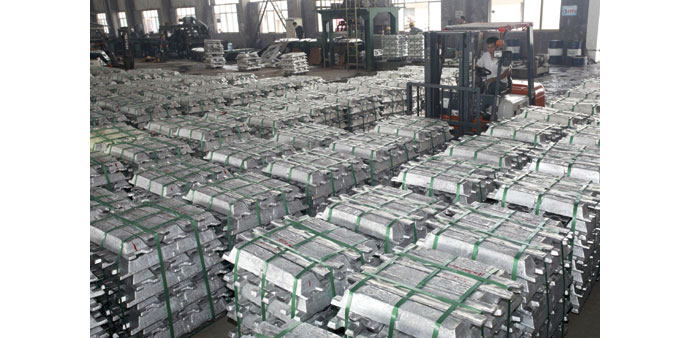A worker drives a forklift to transport aluminium bars at a factory in Anshun, Guizhou
province. China’s top aluminum smelters will reduce capacity by 500,000 tonnes by
year-end, taking total capacity cuts for 2015 to just under 5mn tonnes in a bid to whittle down a domestic supply glut, according to a major trade association.
Reuters
Beijing/Sydney
China’s aluminium smelters on Friday pledged to shut more production this month and not to add any new capacity in 2016, as the industry pushes to shore up plunging prices for the metal.
But market participants and analysts were sceptical about the steps, saying they would do little to dent global overcapacity that has ballooned as the world’s No 2 economy slows after decades of breakneck growth.
In a statement following a meeting of 14 major producers in Yunnan province on Thursday, China’s Nonferrous Metals Industry Association (CNIA) said smelters would shutter another 500,000 tonnes of annual capacity before year-end, bringing the total shut in 2015 to just under 5mn tonnes.
That annual total would equate to about 12% of China’s 42mn tonnes of capacity, but its impact is likely to be diluted as analysts estimate the country has also added at least 2mn tonnes of new capacity this year.
They also said that many of the cuts would have come from shuttering old, inefficient production that would have been closed anyway.
CNIA added that the sector would not start up any new capacity for at least one year or reopen any idled capacity.
“They can (talk about) stopping all the new smelter capacity they like. Nobody is even remotely thinking about building capacity with prices where they are,” said analyst Paul Adkins at China-based consultancy AZ China.
Prices for the metal, used in everything from construction to cars, have been languishing at record lows in China and more than six-year lows on the London Metal Exchange .
But traders and analysts said CNIA’s steps would not do much to erode a global glut of about 14mn tonnes, which has punished prices, on track for their worst year since 2008.
“On the face of it, it looks substantial. However, I’m sure the market will be a little bit dubious until it sees some real evidence,” said strategist Daniel Hynes at ANZ in Sydney.
The steps follow moves over the past month by China’s copper, zinc and nickel industries to try and boost prices in the world’s top metals producer.
China’s state stockpiler was considering buying more than 1mn tonnes of aluminium from local smelters, Reuters reported last month.

